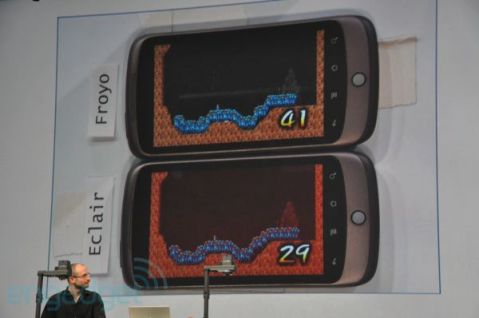 In the U.S. Android has reportedly past Apple’s iPhone in sales, and worldwide it is expected to surpass the iPhone in units deployed by 2011. The secret sauce to its success is no secret; Google reemphasized it today. To date it has 60 Android devices on 59 carriers in 48 countries.
In the U.S. Android has reportedly past Apple’s iPhone in sales, and worldwide it is expected to surpass the iPhone in units deployed by 2011. The secret sauce to its success is no secret; Google reemphasized it today. To date it has 60 Android devices on 59 carriers in 48 countries.
Google shows no signs of slowing down. Today at its I/O Developer event Google revealed that it is now up to an incredible 100,000 Android activations worldwide per day. This is particularly noteworthy as it’s been just weeks since Google CEO Eric Schmidt claimed an impressive rate of 65k activations per day.
And here’s a surprise — Google revealed that its research shows it has a clear lead in the U.S. market in terms of both internet and app usage — well ahead of the iPhone. Apparently even though Google only has a third of the iPhone’s apps (50k v. 150k+), the ones it has are good enough for its users to play with them more. And Google claims 180k developers to boot, so expect more apps soon.
But Google isn’t about to rest on its mechanical laurels, so to speak. Today it unveiled Android 2.2, the secret new version of Android it’s been cooking up under the codename Froyo (“frozen yogurt”).
Froyo brings a Davlik Just-In-Time compiler. For the non-computer programmer crowd out there, this cool tool will let your apps run 2 to 5 times faster as it speeds up Java code. That means Android apps should run smoother, games should be able to have better graphics and effects, higher framerates, etc.
Among the other more technical app related stuff is the addition of 20 new features including new device admin APIs, auto-discovery, security policies, and GAL lookup. For the everyday user one key improvement these features bring is the ability to backup your app data, not just your phone specific files (i.e. phone numbers, etc.), which is already present.
Also new is a cloud-to-device message API which allows for cool things like sending a map directly to your phone, from your PC. The new OS also features tethering to turn your phone into a wireless internet hotspot (assuming you carrier allows it) which can connect “a device that doesn’t have connectivity — how about that iPad”, as Google puts it.
And the new OS brings a new browser, Google Froyo V8. Google claims it’s the fastest mobile browser in existence. And it packs support for both HTML5 and Flash (and Adobe Air for offline Flash apps coming soon, as well). That’s right, there’s no Adobe haters at Google.
The new browser packs voice searching, camera API integration (for web apps like Google Buzz) and more. And it even provides instant translation to a number of languages, including Spanish and French (Mandarin coming soon).
Perhaps, most importantly you can now store and launch apps from your microSD card! Apparently Google has been listening to its customers most pressing requests and demands.
If there was a cloud to be found in the silver lining of Froyo it’s advertising. Google is planning to step up its mobile ad efforts. Assuming the AdMob acquisition survives the FTC, Google has plans for all kinds of tricky ads, such as ads asking if you want to call local restaurants to order, etc.
IPhone OS 4.0 is already pretty much set in stone. And now Google has revealed its counterpunch in Android 2.2. From the looks of it Apple should be very, very worried. Even with Cupertino’s appeal one can only wonder how long it can stand tall against Androids vast legion of handsets, unparalleled features unconstrained by a draconian desire to dictate to the user what they want, and the speedups needed to truly show the full glory of the faster processors found in Android handsets (many operate at 1 GHz). Yes, Apple should be very worried indeed.
Editors' Recommendations
- How to use Google’s Gemini AI app on your Android phone
- Google just announced 9 new features for your Android phone and watch
- Using an Android phone showed me just how bad iOS notifications really are
- Google wants you to know Android apps aren’t just for phones anymore
- Android 13: Everything we know about Google’s big OS update
